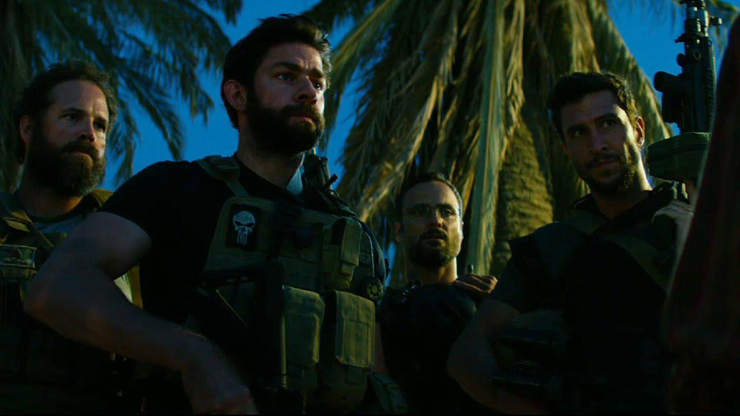
(from left): David Denman, John Krasinski, Dominic Fumusa, Pablo Schreiber.
Michael Bay's 13 Hours: The Secret Soldiers of Benghazi is a combat film at war with peace, a flag-waving report from the trenches in which the real threat to life, liberty and the pursuit of happiness isn't the extremists who shout, “Death to America” as they train their rockets at the good guys from the U.S. of A. It's those head-smackingly ineffectual bureaucrats who want to build bridges in the Middle East. (Cue the barfing emoji.) Its makers may want to pass off this dud as impartial reportage, but who are they kidding?
This taut, rabidly anti-intellectual adaptation of Mitchell Zuckoff's book about the Sept. 11, 2012 incident in the titular Libyan city ostensibly chronicles how six contractors hired to protect CIA case officers at the government agency's annex chose to defend the nearby American diplomatic compound when it came under attack by Islamic militants, even though they were under no obligation to do so. But it's another war, the one being fought within the walls of the CIA annex, that truly seems to interest Bay.
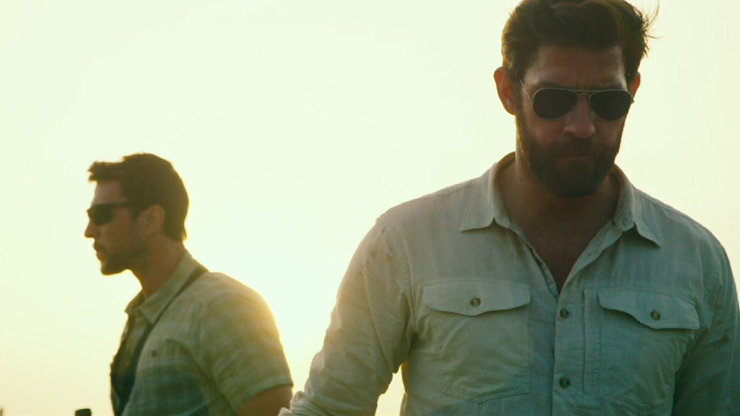
(from left): Pablo Schreiber, John Krasinski.
He doesn't even allow the viewer to ease into the film's setting before establishing an atmosphere of unease and danger for Americans. Former Navy SEAL/audience surrogate Jack Silva (John Krasinski, shrewdly cast against type), fresh off the plane as the movie opens, joins fellow former SEAL Tyrone “Rone” Woods (James Badge Dale), former Army Ranger Kris “Tanto” Paronto (Pablo Schreiber), and ex-Marines Dave Benton (David Denman), Mark Geist (Max Martini) and John Tiegen (Dominic Fumusa). But Silva and “Rone,” who picks up our protagonist from the airport, can't even get to the annex without coming face to face with some trigger-happy ruffians intent on taking their SUV. Leave it to the Bad Boys auteur to reduce the intricacies of U.S.-Libya tensions to a Mexican standoff.
Once at the annex, Jack doesn't even get a hello from Bob (Breaking Bad's David Costabile), the base chief, before the smug pencil pusher unleashes a tirade of contemptuous bile at the new arrival, who's left his blankly wholesome family behind in order to pick up a paycheck for a 16-day contract. “You're not CIA; you're hired help,” Bob snarls, twirling that mustache as Jack glares in stone-faced silence.
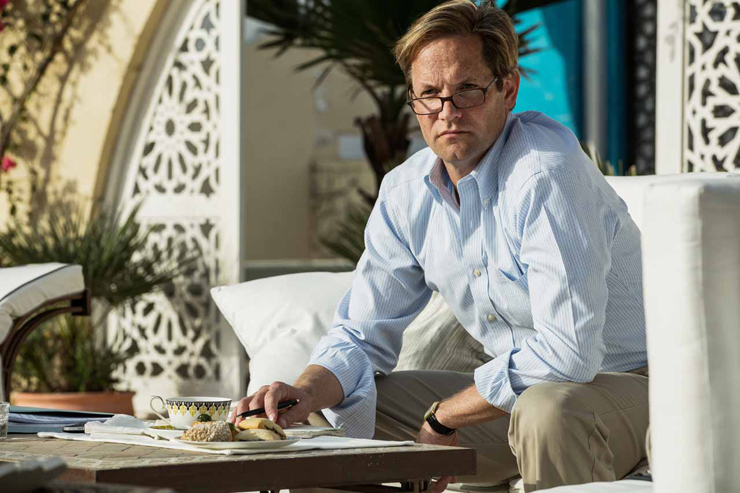
Matt Letscher.
Even though Bay takes pains to map out the chronology leading up to and during the intense exchange of gunfire, he never passes up an opportunity to highlight the chasm of worldviews between the contractors and the government officials, the latter of whom are portrayed here as entitled wet blankets, clueless about the dangerous environment they're in and helpless when their lives are on the line. They're not so much character as a series of progressive talking points molded into stumbling blocks for our heroes.
It's a depiction that, sadly, also applies to undercover CIA officer Sona Jillani (Alexia Barlier). She's described in broad strokes by screenwriter Chuck Hogan as “an American who grew up in France,” which indubitably is code for ice princess. In a fairly representative sequence, Jack poses as Jillani's estranged husband during a street encounter with locals that's abruptly interrupted when the contractors realize they've been made. Jillani, who is gathering intel by posing as an Exxon exec, insists they're just being paranoid, and blames Jack for ruining her rendezvous. Barlier's role serves as an inelegant screw-you to Jessica Chastain's indefatigable Maya in Zero Dark Thirty. For Bay, a filmmaker who's often faced accusations of sexism in his work, this caricature doesn't help mitigate that perception.
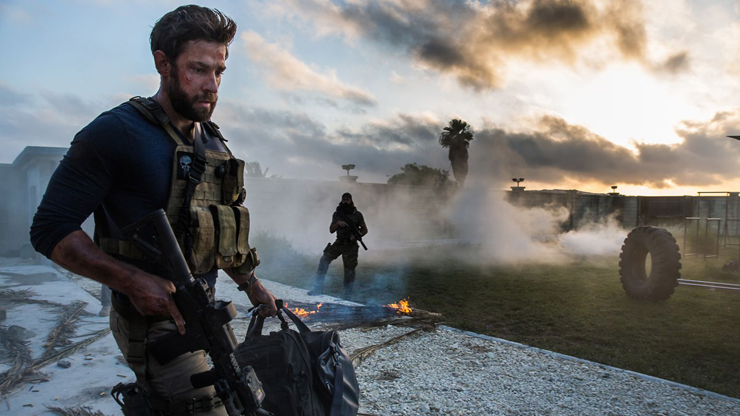
John Krasinski.
Notice I haven't yet mentioned Chris Stevens (TV vet Matt Letscher), who was the Benghazi attacks' most high-profile casualty when he became the first U.S. ambassador to die in office since 1988. That's because Bay seems uninterested in his role beyond its function as a plot device … as well as an excuse to indulge in some subtextual gay baiting. “Pay attention to the florid décor of the compound. Check out the gaudy chandelier,” Bay seems to be pointing out. The ribbing doesn't stop there. The filmmaker goes out of his way to show us how hunky Stevens' security detail is, down to DS Scott Wickland's (David Giuntoli) pornstache. “It's all so very gay,” Bay unsubtly jabs, and you can almost hear him suppressing a giggle. (Stevens was rumored to be gay, a claim backed up by sources who say his sexual orientation was an open secret in diplomatic circles.) As condescending and juvenile as this all sounds, Bay shows relative restraint here when compared with the gay-panic content in some of his other films. The unsavory teasing, however, is fairly apparent if you know where to look.
The simmering tensions blow up in Stevens' face. “THEY'RE NOT BEING CAREFUL,” Bay practically screams at the audience, and it all leads to the infamous “stand down” moment once the bullets start flying. Zuckoff, who co-authored the book 13 Hours is based on with the contractors, stands by his contention that the CIA prevented Silva and his brothers-in-arms from heading to the compound right away. However, and this is a crucial distinction, he also considered alternate scenarios. (Bob's real-life counterpart has vehemently denied giving such an order.) Imagine, then, how much more intriguing 13 Hours could have been if it had included different versions of that night's events so viewers could draw their own conclusions, not unlike Barbet Schroeder's approach in the true-crime drama Reversal of Fortune (1990). But such digressions hold zero interest to Bay. They're dead weight. They'd kill the momentum . They'd just overcomplicate things, so why even bother to entertain them? Besides, he seems to assure us, we all know what really happened.
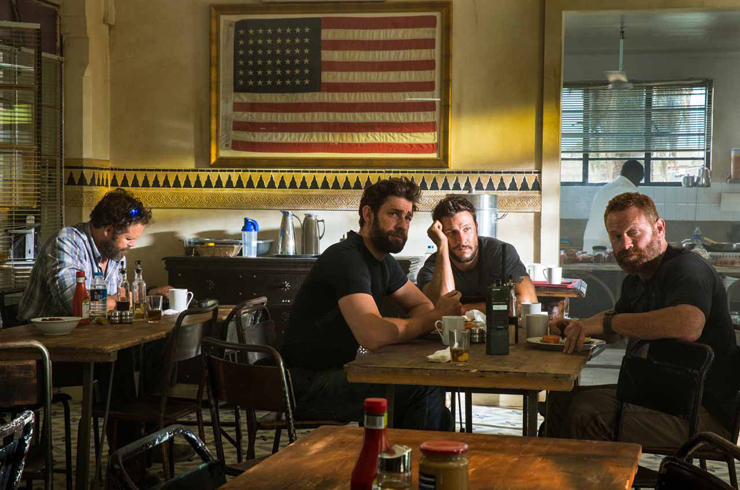
(from left): David Denman, John Krasinski, Pablo Schreiber, James Badge Dale.
It all adds up to a reworking of the us vs. them conflict that propelled Bay's second Transformers feature, Revenge of the Fallen. In that incoherent franchise entry, the good guys have to work around President Obama's inept bureaucrat in order to save the day, a sharp 180 turn from the preceding Transformers, in which Team Shia is aided by a fictitious, conspicuously Republican president played by Jon Voight. 13 Hours quickly becomes less about bringing Benghazi's polarizing events to life than about using this narrative as an excuse to explore Bay's oft-visited themes of macho camaraderie and masculinity, this time set in an environment that frowns on a combative approach to resolving violent threats. Rather than exploring the shades of gray such a scenario calls for, like Clint Eastwood did, to some extent, in the uneven but still more resonant red state fare American Sniper, or Ridley Scott in Black Hawk Down, Bay views what went down in Benghazi in binary terms: might vs. fright, strength vs. weakness, ineptitude vs. professionalism. Diplomacy has no place in this Darwinian world, Bay and Hogan argue. It's a wimp's course of action, well-intentioned yet foolhardy and naïve, and it only succeeds in making Americans more vulnerable. There's nothing muddled, or objective, about this thesis.
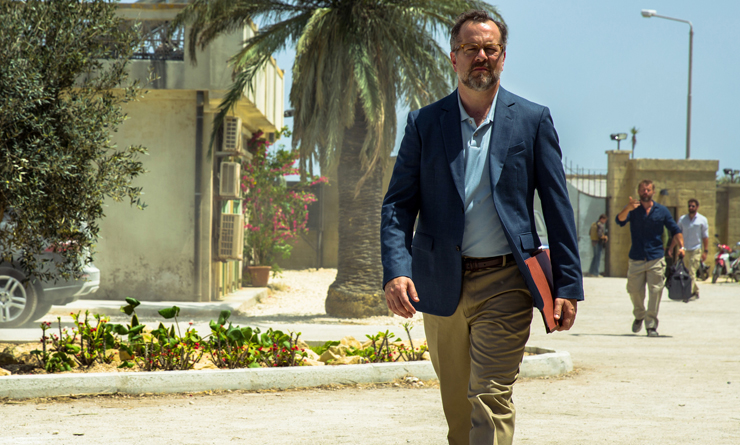
David Costabile.
Much ink has been spilled over how 13 Hours never overtly mentions the Obama administration or then-Secretary of State Hillary Clinton, but it's clear the film is indirectly pointing fingers well above the sourpusses at the CIA annexes and Stevens' Tom of Finland-inspired security detail. Jack and his buddies, naturally, try to take control of the situation and start shootin' them varmints dead. (The film's combat scenes are a mixed bag, skillfully staged whenever cinematographer Dion Beebe isn't OD'ing on fake shakycam or making the warfare look way too video-y.)
“You're not giving orders here. You're in my world now,” Jack informs Bob when he chooses to defy his command. What a grim, overly deterministic realm that world is. We're meant to cheer when the Annex Security Team tell their employer to stick his authority where the sun don't shine, but the effect it had on this reviewer was to simply drive home how slanted and simplistic this war movie is, even as it celebrates these men's bravery. (The cast is uniformly solid, but not even they sell Hogan's cringe-inducing lines.) As Forbes film critic and box office analyst Scott Mendelson observed, there's nothing “apolitical” about 13 Hours being released right before caucuses and primaries take place across the country, with an expected home video release well before a general presidential election. “This is a true story,” Bay announces at the beginning of this misbegotten misfire. You know, because more responsible wording like “based on” is strictly for wusses.




